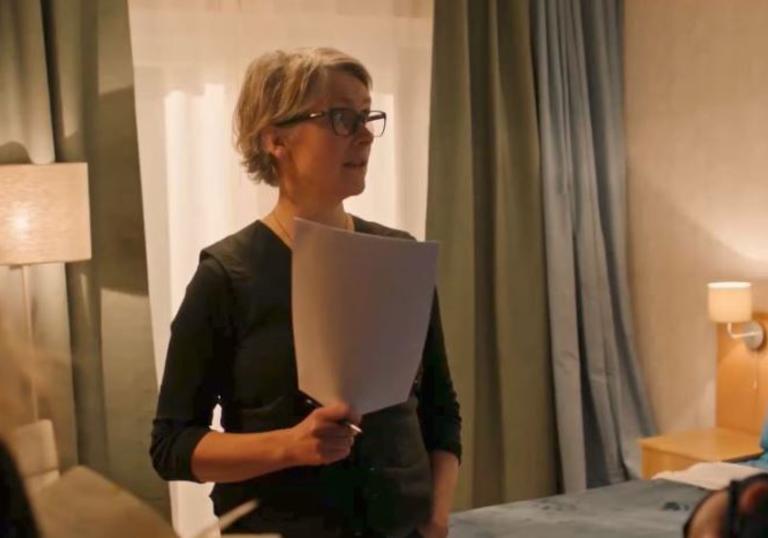Lately, Katie Mitchell’s daughter Edie has been raising a complaint. Mitchell smiles as she mimics her: ‘Mu-uuum! Why do the women in some of your stories kill themselves? Can’t they go forward and do something positive in the world?’ It’s a small proportion of Mitchell’s work on the continent that reaches London, but mostly it accords with Edie’s sentiment. Mitchell was last at the Barbican in 2016 with The Forbidden Zone, a meditation on war, women and human destruction, punctured by the suicides of Clara Immerwahr and her grand-daughter Claire Haber, both scientists opposed to the military use of poison gas. At the same time, Mitchell was at the Royal Court with Ophelias Zimmer (2016), a tense portrait of the psychological damage that preceded Ophelia’s suicide. And in 2017 Mitchell was back at the Royal Court directing Alice Birch’s intricate play Anatomy of a Suicide, which places the lives of three generations of women side by side on stage, two of whom also end their own lives.
You might guess from the title that The Malady of Death, also written by Birch, from a novella by Marguerite Duras, points in the same direction. In fact, it’s the affliction of a male character who pays a woman to spend several nights with him, to test his capacity to love or even feel. The original, says Birch, focuses on ‘the man’s psychology: why he needs to go through this experience, and why he needs to use the woman this way’. And initially she remained faithful to that, albeit with a couple of key interventions. Duras says almost nothing about the background of the woman; to counter this, Birch rewrote her as a sex worker, and single mother, someone for who the financial offer would be paramount. And she indicates that the man watches ‘the darker end of porn’, to question how he became ‘anaesthetised to feeling’.
We show oppression to wake everyone up to its existence, so that change can then happen
Malady is Birch’s fourth collaboration with Mitchell – as well as Anatomy, for which she won the 2018 Blackburn Prize, she wrote the adaptation of Ophelias Zimmer, and Schatten, a version of the Eurydice story, in which she resists leaving the Underworld with Orpheus – and the pair are ‘a real match’ in their interest in looking directly at the damage wrought by social, specifically gender, inequality. Mitchell adds, ‘How do you critique something without exposing what it does? To show the effects of patriarchy, to some extent you have to show what happens to women who are oppressed.’ And – picking up on that critique of her daughter’s – she clarifies: ‘I show the effects on women inside patriarchal structures, their attempt to cope with them and fight them, but I don’t offer alternative structures.’
Instead she works with writers to create an alternative body of theatre texts that ‘recognise the validity of the oppression’. A historically male canon requires ‘political intervention’ to bring the voices of women forward and undo centuries of damage. Ophelias Zimmer is a case in point: Mitchell asked Birch to write it because ‘as we drag a play like Hamlet through time we drag with it the toxic gender politics of the original historical period and present them as somehow acceptable. And we really can’t do that any more.’ Birch agrees: ‘It feels like there’s so much exposing to do. When I sit down to write, I tend to feel quite hopeless – and galvanised by feeling hopeless.’ For both, says Mitchell, the impetus is one of provoking change: ‘We show oppression to wake everyone up to its existence, so that change can then happen.’
When I sit down to write, I tend to feel quite hopeless – and galvanised by feeling hopeless
There is, however, a challenge Mitchell does accept and rise to: ‘I’ve learned through conversations with the younger generation of fourth-wave feminists to be very cautious about my use of the word feminism in relationship with the work, because its definition is constantly developing and growing. When I use it, it relates to a belief in equality being about economics primarily: now everything is more complex and nuanced. There’s no intellectual stasis with feminism.’ This intergenerational conversation impacts how she talks about The Malady of Death: ‘There are just two camera operators, a man and a woman, and all the time we were thinking about the difference between the female gaze and the male gaze, and trying to use film to be really clear about that subjectivity. But it’s worth saying that the piece doesn’t go into a more intersectional territory or the current trans movement: it doesn’t investigate those ways of looking or thinking.’
We were thinking about the difference between the female gaze and the male gaze, and trying to use film to be really clear about that subjectivity
A director always seeking ‘new models of narrative or working practice’, Mitchell charts ‘a huge development, from a feminist point of view, from The Forbidden Zone to Ophelias Zimmer to Malady. There’s much more agency in Malady: it shows both the oppression – not degradation, those are very different things – and the rejection of the oppression, with the woman asserting a new life, a new way of looking.’ For Birch, it was important to do this sensitively: ‘You want to be realistic and truthful in thinking about women who exist in these kinds of relationships – you don’t want to sentimentalise.’ No glib happy ending then, no new world or alternative structure either. Only an open question, seen through the woman’s eyes, of what these things might be.

